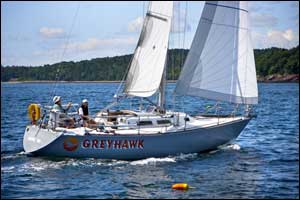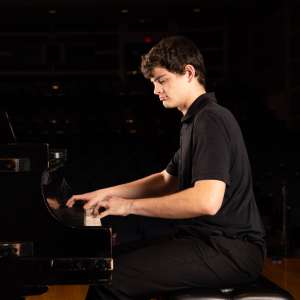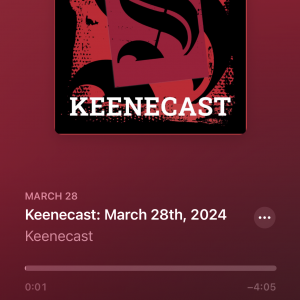Adventure Aboard Greyhawk

On Friday, June 3, Keene State Environmental Studies Professor and skipper Tim Allen set sail from Newport, Rhode Island, to St. George’s, Bermuda, for the 18th running of the biennial Bermuda One-Two Yacht Race, put on by the Goat Island Yacht Club, Newport Yacht Club, and the St. George’s Dinghy and Sports Club. The race is run in two 635-nautical-mile legs: Dr. Allen will sail the first Newport-to- St. George’s leg solo. In Bermuda, he’ll pick up his wife and KSC alum Wendy Thorpe Allen ‘88 and set sail on June 16 for the second leg from Bermuda back to Newport.
Though there are awards for each leg of the race, the overall winner is determined by the combined time for both legs. The Allens are sailing their 34’ Peterson sloop, Greyhawk, a tried and true racer. Over the past three years, they’ve been participating in racing sanctioned by the Gulf of Maine Ocean Racing Association (http://www.gmora.org) and select other events. In 2010, they finished in first place for the season in the GMORA Racing Division 3, Central Region, and second place in the competition for the GMORA Ocean Planet Shorthanded Racing Trophy. They’ve also won several other races, but the Bermuda One-Two is the big one.
“It’s grueling,” Dr. Allen said, especially of his first solo leg. He expects it to take him about 120 hours, or five days, to reach Bermuda. Fortunately, the sloop can be sailed most of the way by autopilot. Even at that, there’s little time for sleep, because there’s plenty for the lone sailor to do. Dr. Allen will spend most of each day trimming the sails, navigating, downloading weather info, cooking, eating, and watching for other ships. The weather can be treacherous, especially when Greyhawk crosses the Gulf Stream and the wind blows contrary to the direction of the Gulf current. “Racing single-handed really puts the accent on ‘self-sufficient’ and raises the level of challenge significantly,” Dr. Allen said. “It’s going to be a great adventure!”
“Managing your sleep is a very important part of it.” Dr. Allen noted. To prepare for his great adventure, he took a seminar recently with Dr. Claudio Stampi, the founder and director of the Chronobiology Research Institute, which studies the effectiveness of short naps in extreme conditions. A sailor himself, Dr. Stampi bases his research on the habits of long-distance solo sailors as a key to help emergency workers who must function effectively on little sleep. The secret to best managing limited sleep time? Break it up into short naps (20-30 minutes) throughout the day.
“I really enjoy ocean sailing and want to extend my adventuring further,” explained Dr. Allen. He feels it makes him a more self-sufficient, well- rounded individual, and a more effective teacher. “My direct experience with the natural world, whether in mountains or on the ocean, greatly informs my teaching of the natural sciences and environmental studies. The ocean/atmosphere interface - where we sailors play - is where a lot of the action is happening around the issue of global climate change. Sailing draws upon, and supports, many areas of academic study, including meteorology, oceanography, physics, and alternative energy, among others - even psychology and chronobiology! The skills of the navigator in locating oneself, recording where one has been, and determining where to go next carry over into the work of a field scientist. In many ways, a voyaging sailboat is a model study in self-sufficient life support and sustainability. I also believe that my sense of identity as an explorer and adventurer also greatly informs my teaching. I believe we can all benefit from adopting a little spirit of adventure and exploration into our learning and our lives - especially so for our students. At some point, I hope my teaching schedule will allow me the opportunity to introduce an ISP Natural Science Perspectives course on the ‘Science of Sailing.’”
Keep Abreast of His Progress?You won’t have to wait for news on how Greyhawk is faring. Since all the boats carry satellite tracking devices, you’ll be able to track the race in near real-time at the iBoattrack Race Tracking site. You can also subscribe to email updates, sent from the deck. If you aren’t subscribed to the email list, you can see the archived messages here.
If you’d like to know more about the Allen’s sailing adventures, and Greyhawk’s pedigree, check out Dr. Allen’s sailing blog. It’s very informative!
Join the Keene State Community in wishing Greyhawk fair winds!





